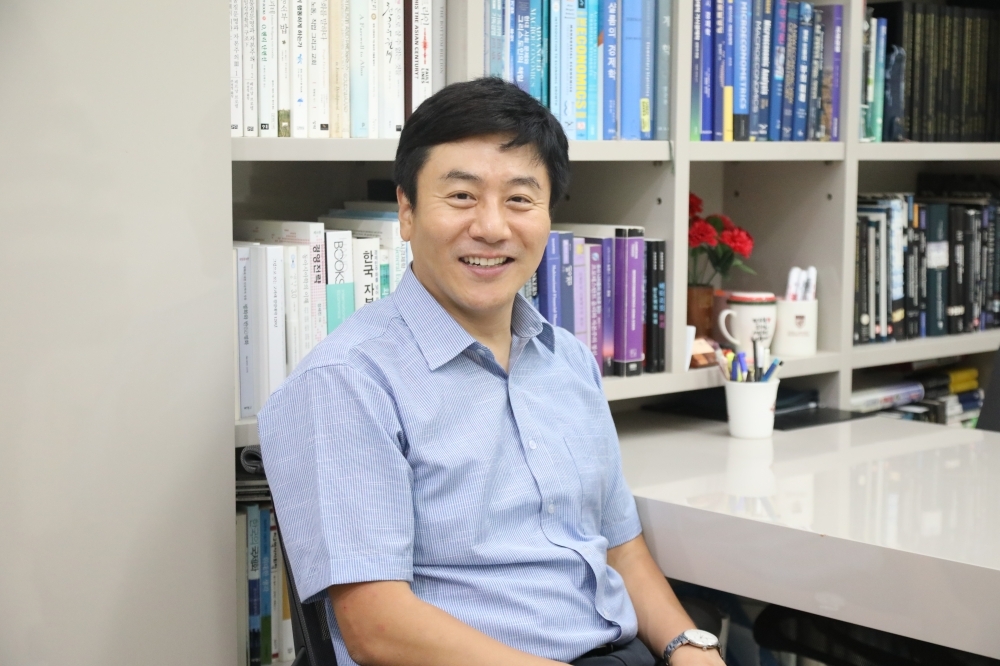News
KUBS News
[SK Paper Award Interview] Professor Juhyun Pyun on “A New Interpretation of Global Imbalances”
2025.10.13 Views 1329 국제실
[SK Paper Award Interview] Professor Juhyun Pyun on “A New Interpretation of Global Imbalances”

In 2025, Professor Ju Hyun Pyun of Korea University Business School, as a co-corresponding author, co-authored a paper titled “Fear of Appreciation and Current Account Adjustment” with Paul R. Bergin and Kyunghun Kim. The paper has been accepted for publication in the international journal Journal of International Economics and has been honored with the Paper Award at the SK Awards.
To celebrate the achievement, Professor Pyun shared insights into the research journey and the philosophy that guided his work.
Q1. First of all, congratulations on receiving the Paper Award. Could you briefly introduce yourself and your paper?
My paper analyzes, both empirically and theoretically, how the “fear of appreciation” — the tendency of some countries to resist currency appreciation — affects the process of current account adjustment, which represents the balance between a country’s exports and imports.
In the empirical analysis, we find that in countries that suppress currency appreciation through exchange rate policies, current account imbalances adjust faster when in deficit than when in surplus.
Using a multi-country monetary model, we then theoretically show how such policy constraints can explain this asymmetry in adjustment speed.
The paper offers a new approach to testing a long-standing hypothesis first proposed by Nobel Laureate Milton Friedman, while also illustrating how exchange rate and foreign exchange policy environments can have structural implications for global firms’ investment and supply chain strategies.
Q2. What motivated you to begin this research, and what was the core problem you aimed to address?
Global imbalances—particularly the persistent asymmetry in adjustment speeds between current account surplus and deficit countries—have long been a central topic in both academic and policy debates.
While previous discussions often emphasized Milton Friedman’s intuition that exchange rate flexibility facilitates adjustment, in practice, many emerging economies have resisted currency appreciation and accumulated substantial foreign reserves.
My research began with this question: Why does surplus adjustment tend to be slower, while deficit adjustment occurs more rapidly?
This question also holds practical significance for global firms, as a country’s exchange rate policy directly influences export competitiveness, the profitability of overseas investments, and the flow of global capital.
Q3. What is the most important message this paper conveys to academia or the industry?
The central message of the paper is that the asymmetry in current account adjustment speeds is not simply a market-driven outcome, but rather an institutional result of policymakers’ “fear of appreciation” stance.
From an academic perspective, the study points to a new direction for international macro-financial modeling—one that endogenizes policy constraints within theoretical frameworks. From a policy standpoint, it cautions that persistent foreign exchange market interventions may contribute to the prolonged nature of global imbalances.
For global firms, the findings imply that countries with larger current account surpluses tend to face greater uncertainty arising from exchange rate stabilization policies. In this sense, understanding a country’s policy stance—beyond merely forecasting exchange rate movements—becomes a crucial element of risk management in foreign investment, pricing, and supply chain decisions.
Q4. Do you have any personal methods for overcoming slumps that often occur in academic or research life?
When I experience slumps in my research life, they usually don’t stem from the research process itself, but rather from moments when journal reviewers fail to recognize the value of my work—which can be quite discouraging.
I don’t have a particular method for overcoming such moments, but I think the belief that research is my calling allows those slumps to pass rather quickly.
Q5. Are there any new research topics or directions you would like to explore in the future?
Looking ahead, I plan to examine how the recently revived debates over Trump-era tariff policies may be reshaping the mechanisms of global imbalance adjustment.
One of the key objectives of these U.S.-imposed tariffs is to address the country’s current account deficit, and I am particularly interested in how this policy shift is influencing global firms’ foreign investment patterns and localization strategies.
From the corporate perspective, this signals the emergence of a new era in which capital flows and exchange rate stability are being managed in fundamentally different ways.
Q6. Do you have any words of advice for students who wish to pursue a career as a researcher?
In social science research, I believe that what matters most is how we define our fundamental values in understanding the world and the people we study.
The perseverance to continue research, even when the results are not as expected, comes from that very conviction.
A summary of Professor Ju Hyun Pyun’s paper is introduced below.
This paper finds that one-sided nominal exchange rate interventions in the form of a “fear of appreciation” slow the adjustment of current account surpluses, providing new evidence in support of Friedman’s hypothesis that adjustment occurs more rapidly under flexible exchange rates. The analysis shows that countries with more flexible exchange rate regimes exhibit faster convergence than peggers in correcting current account deficits, but not in the case of surpluses. This asymmetry is linked to the one-sided suppression of currency appreciations observed in certain economies.
To capture this mechanism, we develop a multi-country monetary model that incorporates a “fear of appreciation” policy rule governing foreign exchange intervention, solved as an occasionally binding constraint. The model illustrates how government capital flows that sustain exchange rate regimes can influence international financial adjustment, and it successfully explains the pronounced asymmetry in current account adjustment speeds across different exchange rate regimes and current account positions.


